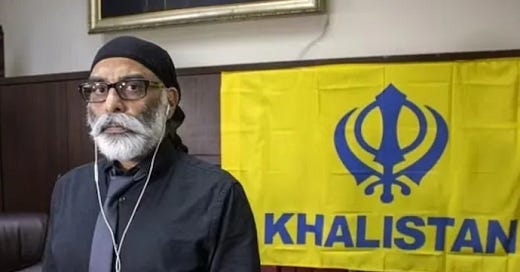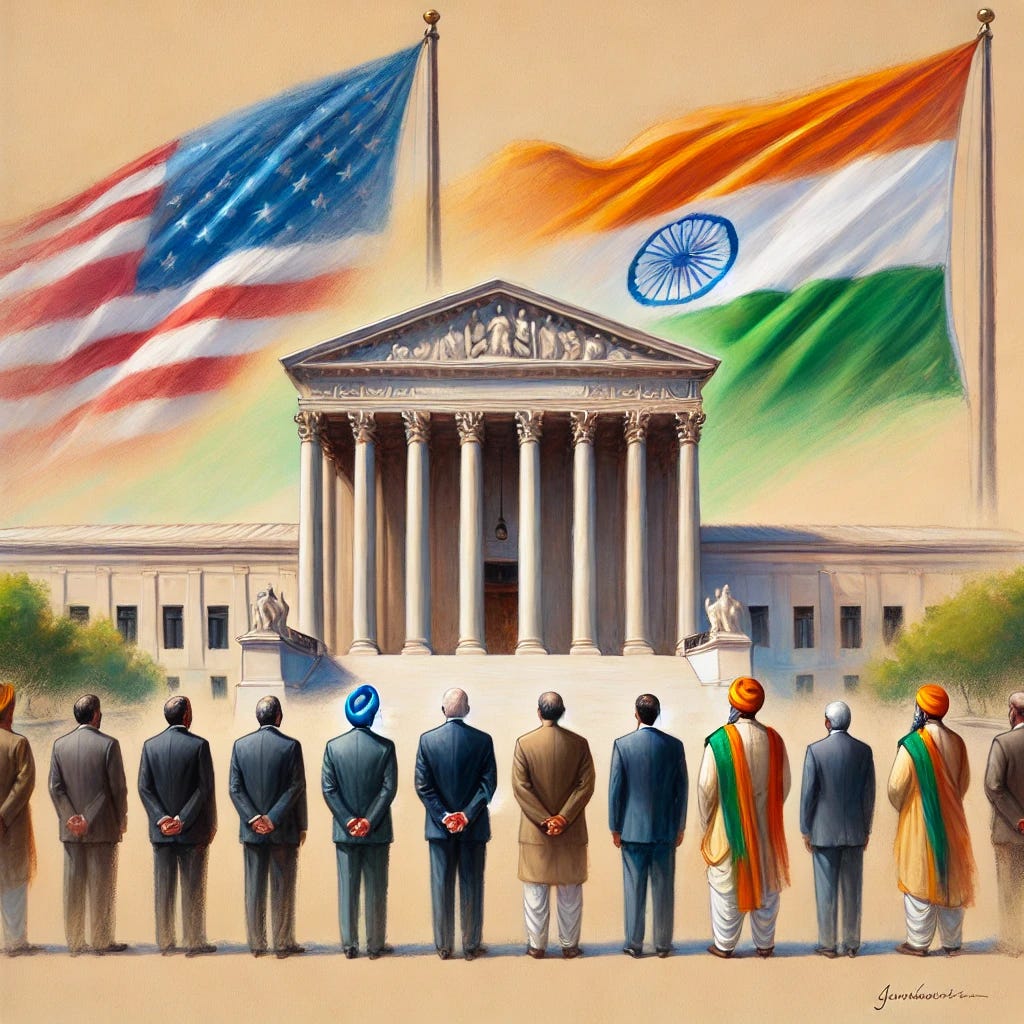US Court Summons NSA Ajit Doval and ex-RAW Chief Samant Goel in Pannun's Civil Lawsuit
Self-Styled Khalistan Ideologue Gurpatwant Singh Pannun Alleges Indian Government Conspiracy to Assassinate him on US Soil.
US Court Summons Top Indian Officials in Alleged Assassination Plot
In a significant legal development, the US District Court for the Southern District of New York has issued summons to high-ranking Indian officials, including National Security Advisor Ajit Doval and former RAW chief Samant Goel, in connection with a lawsuit filed by Khalistani separatist leader Gurpatwant Singh Pannun. The allegations of a plot to assassinate Pannun on US soil have ignited a diplomatic storm between India and the United States, following Pannun’s initiation of these legal proceedings. This case carries far-reaching implications, raising complex questions about international law, diplomatic immunity, and the rule of law.
The Lawsuit and Summons
The case took a sensational turn on September 18, 2024, when Pannun, an India-born US-Canadian dual citizen and self-proclaimed leader of the pro-Khalistan group Sikhs for Justice, filed a civil lawsuit alleging that Indian intelligence agencies plotted to assassinate him on American soil. According to the lawsuit, RAW officials, with the approval of NSA Ajit Doval, recruited businessman Nikhil Gupta, who is currently incarcerated in New York, to carry out the assassination. The plot was reportedly foiled when the hired hitmen turned out to be undercover US law enforcement agents.
The District Court of the southern district of New York has issued summons to the Government of India and several prominent figures:
The Government of India
NSA Ajit Doval
Former RAW Chief Samant Goel
RAW agent Vikram Yadav
Businessman Nikhil Gupta
Those named have been asked to respond to the summons within 21 days, placing them in a legally precarious position. Failing to respond could lead to further complications, particularly for officials like Ajit Doval, who may need to travel to the US in the future, even under diplomatic immunity.
Diplomatic Immunity vs Legal Obligations
Diplomatic immunity provides a level of protection for officials on foreign soil, but it is not absolute. For example, the immunity does not apply in cases where actions are deemed non-official or outside the scope of diplomatic duties. In this case, the allegations involve actions that could fall under criminal conspiracy, complicating the scenario for those named.
The challenge for Indian officials is that skipping a summons in the US is not a trivial matter. Any future visits to the US—even on diplomatic passports—could be subject to legal scrutiny, raising the stakes for those involved. While diplomatic immunity may provide some shelter, it does not necessarily shield them from the long arm of the US legal system. Ignoring the summons could lead to further legal actions, including default judgments or arrest warrants, especially if the case gains traction in US courts.
India's Response: A Matter of Sovereignty
The Indian Government has reacted strongly, dismissing the allegations as baseless. Foreign Secretary Vikram Misri termed the summons “unwarranted and unsubstantiated,” emphasizing that Pannun’s organization is banned in India under the Unlawful Activities (Prevention) Act for its alleged involvement in anti-national activities. India has maintained that the allegations do not reflect the true nature of the situation and accused Pannun of using the US legal system to further his separatist agenda.
India’s rejection of the summons also highlights a sensitive issue: the US Court’s involvement in matters that India sees as an internal security concern. Pannun's Sikhs for Justice group has long been banned in India, but its activities have found a platform abroad, particularly in North America, where Pannun continues to advocate for the Khalistani movement, much to the chagrin of the Indian Government.
US Law and Diplomatic Implications
This case has put the US in a delicate position. While the court has issued summons, the US government, particularly the Biden Administration, must tread carefully to avoid further diplomatic fallout. However, the US cannot directly interfere with the due process of its courts, leaving Indian officials in a challenging situation.
In cases like this, the legal process in the US operates independently, with the executive branch having limited influence over court proceedings. While the Indian government might seek to leverage its diplomatic ties to have the case dismissed, such an effort could be perceived as interference in the US judiciary—a risky move that could backfire. On the other hand, challenging the summons in an appellate forum risks indirectly implying that the Government of India or the concerned officials are submitting to US laws and its judicial system. Furthermore, an adverse ruling in the appellate forum could escalate the situation, making it even harder for the Biden administration to support India's position or intervene on its behalf.
Pannun’s Legal Salvo: A Calculated Publicity Stunt?
While the specific relief sought by Gurpatwant Singh Pannun in his lawsuit remains unclear, there is little doubt that this legal action is a strategic attempt to elevate his profile as a Khalistan ideologue. The lawsuit offers him significant publicity, particularly among the separatist Sikh community—a microscopic minority among Sikh citizens and non-citizens in the US and Canada—while the overwhelming majority of Sikhs remain staunchly pro-India, having rejected and denounced the very idea of Khalistan. By portraying himself as a victim of an alleged assassination plot, Pannun seeks to bolster his stature and attract further funds for his anti-India activities, despite representing only a fringe element. In response to this audacious move, the Government of India should consider deploying its full diplomatic might to seek Pannun’s extradition, ensuring he faces the charges levied against him in India. After all, as the adage goes, sometimes the best defence is a strong offence.
The Road Ahead: A Diplomatic Tightrope
As this case unfolds, it is poised to place significant strain on India-US relations, which have otherwise been strengthening in recent years. The legal process in the US will continue independently, with diplomatic implications hanging in the balance. Any misstep—by either India or the US—could exacerbate tensions, particularly as the US aims to maintain its strategic partnership with India while upholding its own legal principles and transparency.
For Indian officials named in the lawsuit, the stakes are especially high. Ignoring the summons risks serious legal consequences, including potential restrictions on future travel to the US and complicating diplomatic engagements. Given the legal nature of the summons, it could be an opportune moment for India to push for Pannun’s extradition, rather than simply challenging the allegations. By aggressively seeking his extradition to face charges in India, the Indian government would not only shift the focus of the case but also demonstrate that Pannun’s nefarious activities will not go unchecked.
The Indian government will need to carefully navigate this complex situation. While diplomacy can address many tensions, the US legal system is not easily swayed by political manoeuvring, no matter how powerful the player. In this scenario, India’s best option may well be to shift from defence to offence, using this legal battle as a platform to intensify its own pursuit of justice against Pannun. Balancing diplomacy with legal strategy will be key to preventing a full-blown diplomatic crisis.






……though it is a serious matter concerning India-USA relations , yet it is interesting to watch the difference between the pseudo kind of judiciary verses so known real judiciary in the world……